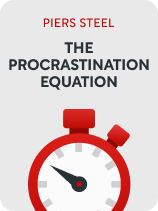

This article is an excerpt from the Shortform book guide to "The Procrastination Equation" by Piers Steel. Shortform has the world's best summaries and analyses of books you should be reading.
Like this article? Sign up for a free trial here.
What is The Procrastination Equation by Piers Steel about? Do you frequently delay important work until right before the deadline?
In The Procrastination Equation, Piers Steel discusses the reasons behind procrastination and its consequences. He also provides strategies for combating the most common procrastination triggers.
Read below for a brief overview of The Procrastination Equation.
The Procrastination Equation by Piers Steel
Do you frequently delay important work until right before the deadline? Do you find yourself distracted and overwhelmed by your daily tasks, unsure of how to begin them? If this sounds familiar, you’re not alone—according to The Procrastination Equation by Piers Steel, nearly 95% of people say they procrastinate, and a quarter of them identify procrastination as a pervasive, prominent trait.
(Shortform note: Procrastination seems to have increased substantially over the years. Steel reports in a 2007 research paper that in 1978, survey results suggested that around 5% of people were chronic procrastinators. By 2007, that number had jumped to 26%. Some experts posit that the increasing use of the internet and electronic devices in the past decades has been (and continues to be) the primary cause of this jump. The internet is now part of nearly every aspect of daily life for most people, and it provides ample forms of distraction that contribute to procrastination.)
To address this common problem, Steel wrote The Procrastination Equation, exploring strategies to help procrastinators increase their motivation and reclaim control over their time. By reducing distractions, building confidence in your abilities, and making unpleasant tasks more valuable for yourself, you can begin to overcome procrastination.
Steel has spent his career researching the science of procrastination and motivation. He holds a doctorate in industrial/organizational psychology, and he’s a Distinguished Research Chair at the University of Calgary. His work has appeared in publications such as Psychology Today, Good Housekeeping, and The New Yorker. Additionally, he started the Procrastinus website, which connects people with research and resources for understanding and reducing procrastination.
What Is Procrastination?
Steel defines procrastination as purposefully putting off tasks against your better judgment and contrary to your best interests.
For example, going to see a movie to avoid renewing your driver’s license at the DMV qualifies as procrastination—you’re actively avoiding an important task and, in doing so, accepting potentially negative consequences like missing the deadline and creating more stress for yourself later.
Postponements for reasons that are logical and outside of your control don’t count as procrastination. For example, if you’re stuck in traffic when you’re supposed to be making a phone call, delaying the call until you get to your office makes sense. You’ll be safer and more focused on the call if you make it while you aren’t distracted by traffic.
Why Do We Procrastinate?
Now that we’ve explored Steel’s definition of procrastination, we’ll examine the top three reasons we procrastinate:
- Choosing instant gratification over long-term gain
- Disliking the task we must complete
- Believing that we’re going to fail
Reason #1: We Choose Instant Gratification Over Long-Term Gain
First, Steel argues that choosing instant gratification over long-term gain often plays a substantial role in procrastination. People who procrastinate for this reason choose rewards they can get right away over those they have to wait for, even if the payoff of waiting is much larger.
Therefore, rather than working toward long-term goals step-by-step, these procrastinators are more likely to put off tasks with future deadlines until the last minute. They procrastinate by making impulsive decisions that bring them immediate pleasure without fully considering the consequences of delaying their more important tasks. This creates urgency and stress once they finally reach deadlines and have to complete the tasks in drastically shortened time windows.
Steel says the tendency to act on impulses for immediate rewards stems from a general human propensity to view future tasks as abstract and immediate tasks as concrete. When we think of tasks and concerns in abstract terms, we’re less likely to act on them, making us more likely to act based on immediate instead of future concerns.
For example, say you’re an artist, and you want to submit your painting to an art show. The deadline to submit is a month away, which feels abstract, so you don’t fill out your application yet. Over the next few weeks, every time you think about filling it out, you tell yourself that you still have plenty of time. You choose to do something more concrete and immediately enjoyable instead, like reading a book or scrolling through social media. Then, one day, you realize there’s just a few hours until the deadline, and you have to scramble to get your application materials together. They aren’t as good as they could have been if you’d acted sooner, and you cause yourself a lot of unnecessary stress trying to get them in on time.
Reason #2: We Dislike What We’re Doing
Second, Steel states, we often procrastinate on tasks we dislike and find unpleasant, dull, or pointless. This is due to the value we place on tasks, which stems from our relative enjoyment of them—the less we enjoy doing something, the less valuable we find it, and the less motivated we are to do it promptly. Instead, we spend time on activities we enjoy doing more.
For example, many of us put off paying monthly bills until the last minute. The task is tedious, and boring tasks are one of the things we most commonly procrastinate on. Additionally, it can be stressful watching large amounts of money leave our accounts every month, contributing to our dislike of the task and making us want to delay it as long as we can.
Reason #3: We Believe We’ll Fail
According to Steel, many of us procrastinate because we believe we’ll fail at the task we’re avoiding. Instead of pursuing the task and risking the pain of failure, we postpone it as long as we can.
For example, say you’ve been going on dates to eventually start a new relationship. However, you’ve had several bad dates in a row, and your self-confidence begins to decline. You start postponing and canceling dates, assuming they’re going to fail, which takes you further from your original goal of finding a partner.
The Negative Consequences of Procrastination
No matter why we do it, procrastination can have many negative consequences, especially when it becomes chronic. Steel asserts that chronic procrastinators are less successful and satisfied in all realms of life.
(Shortform note: Almost everyone procrastinates sometimes, but only a fraction of people qualify as chronic procrastinators. To determine whether you fall into the latter category, look for the following signs: 1) You consistently struggle to meet deadlines. 2) Procrastination affects your relationships with friends and family. 3) You procrastinate in multiple realms of your life (at work, at home, with friends, and so on). 4) The stress of putting things off affects your sleep and physical health.)
Here, we’ll spotlight how procrastination impacts two realms of life: health and financial success.
Realm #1: Health
According to the author, one of the most common things people procrastinate on is routine medical care, which can have serious implications for health and longevity. Many diseases and infections are easier to treat when they’re caught early, but people still postpone doctor’s visits and preventive screenings because they’re unpleasant. Due to these delays, procrastinators are often less healthy than people who struggle less with procrastination.
Likewise, the traits that typically accompany the tendency to procrastinate—such as impulsivity and lack of self-control—make procrastinators more susceptible to unhealthy habits, including excessive alcohol consumption and smoking. These habits represent short-term pleasure, which procrastinators favor over long-term health outcomes.
Realm #2: Financial Success
Steel argues that procrastinators are typically less financially successful than their peers. Procrastinators often delay paying off debt, meaning they end up paying more in fees and interest. Additionally, they typically wait much longer to start saving for retirement, so they end up without enough money in old age.
How Can We Avoid Procrastinating?
We’ve defined procrastination, explored the main reasons we do it, and considered some of its most common negative consequences. Now, we’ll discuss how to avoid procrastination by exploring three of Steel’s strategies:
- Managing distractions and impulses
- Making your tasks more interesting
- Building your confidence
Within each strategy, we’ll touch on specific anti-procrastination techniques you can apply in your everyday life.
Strategy #1: Manage Distractions and Impulses
Steel notes that since impulsivity causes procrastination, managing distractions and impulses can prevent procrastination. If you avoid things that offer tempting immediate rewards, you reduce the amount of time you spend delaying important tasks.
Strategy #2: Make The Task More Valuable to You
Steel’s second strategy addresses the second reason for procrastination—disliking what we’re doing—by making tasks more interesting (and thus more valuable) to us. In today’s world, most work is broken into routine, repetitive tasks that contribute to monotony and boredom, such as doing inventories, entering data into spreadsheets, and writing reports. We struggle to feel motivated to complete these dull tasks because our brains deem them unimportant. Thus, we procrastinate, and the unpleasant work adds up.
Strategy #3: Build Your Confidence
Steel’s third strategy is building your confidence to avoid procrastination that’s based on the fear of failure. As we touched on earlier, the less confidence you have in your ability to succeed, the less motivated you’ll be, and the more likely you are to procrastinate.
On the other hand, Steel says that being too confident about your ability to succeed can also result in procrastination. If you believe that everything will work out no matter what, you might wait for success and good fortune to come to you instead of working to make it happen. Additionally, overconfident people often underestimate the amount of time needed to complete tasks, so they wait until the last minute to begin. This can undermine their results.
To successfully avoid procrastination, you must strike a balance between acknowledging the work it’ll realistically take to complete a task and believing that you’re capable of succeeding.

———End of Preview———
Like what you just read? Read the rest of the world's best book summary and analysis of Piers Steel's "The Procrastination Equation" at Shortform.
Here's what you'll find in our full The Procrastination Equation summary:
- Strategies to help procrastinators increase their motivation and control
- How to make unpleasant tasks feel more valuable for yourself
- Why procrastinators are typically less financially successful






